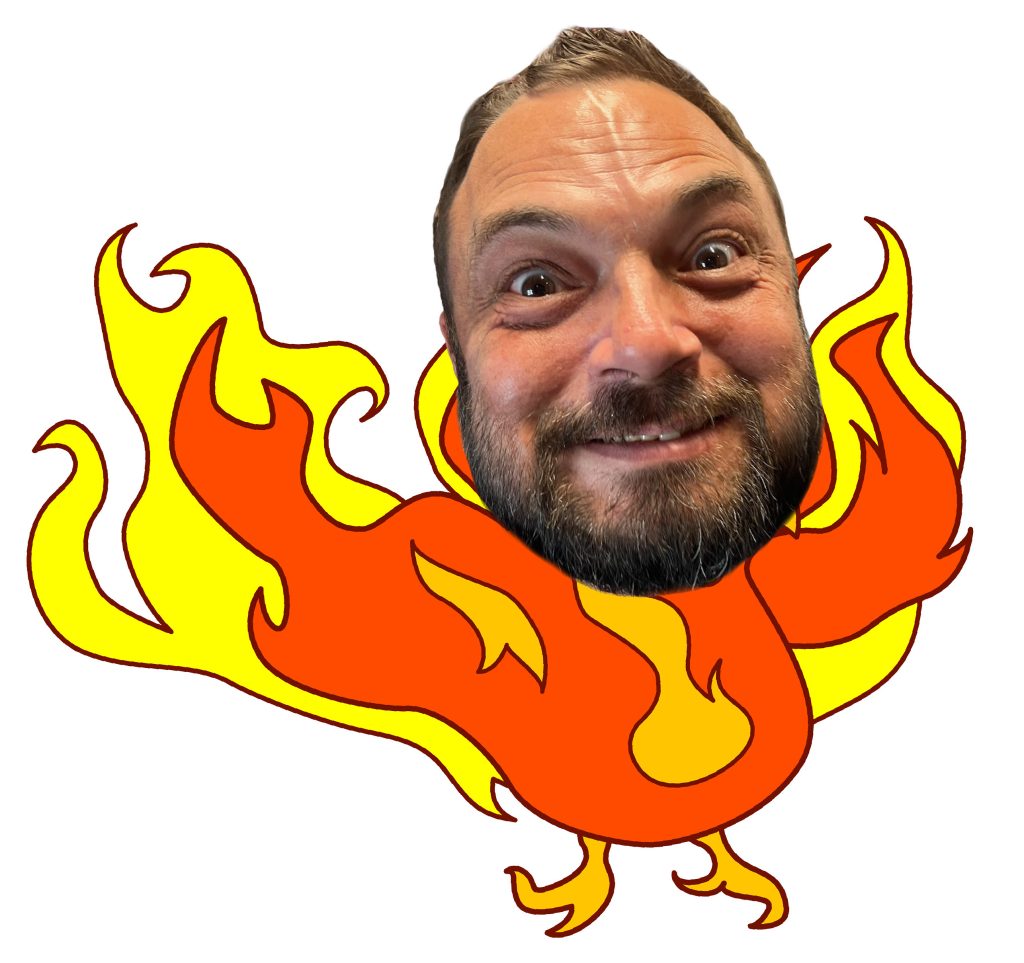Adam Guss: Phoenix Rising!
Meet Adam Guss! Guss – as he’s known around CORE – directs CORE’s transportation department in Branson. He also manages one of our men’s homes. On top of all that, Guss also is a star player on CORE’s softball team that plays in the Branson Church League.

As we sat down with Guss and began hearing his testimony, not only were we mesmerized by his story, but we also felt the strangest sensation seize us. In our mind’s eye, we practically could see Guss rising from the ashes. His story plainly is about transformation and rebirth! Given a second chance at life, he has arisen renewed and radiant. Today, Guss soars beyond his past difficulties toward newfound heights of growth and possibilities.
We became overwhelmed by a light bulb moment — Guss is a phoenix rising! Or, so we hypothesized. The only way we could make sure is by putting feathers and bird’s feet on Guss to see how he looks. Does he look like a phoenix? What do you think?
If Guss is or even is like a phoenix, it’s only because he has had a spiritual experience. We must remember, however, that such experiences while very powerful often begin with great suffering. So that’s where we’ll begin his story.
Twenty years ago, Guss was barely out of high school when he became an addict. Like most addicts, Guss was not exactly a party animal. Rather, he was involved in a car accident that injured his shoulder and required surgery. The surgery wasn’t entirely successful, so his doctors put him on pain medication until another one could be performed. “Percs and Norco 10s,” Guss told us, that’s all it took:
“I’d had two shoulder surgeries. The first one didn’t go well, and they had to wait to go back in there. Until then, all they could do was keep me as comfortable as possible. That’s where my addiction to opiates took off. By the time of the second surgery, I was finding OxyContin on the streets from other people.”
Guss kept buying Oxys until they became too expensive, so he started buying heroin. Then he discovered methamphetamines. Meth, Guss tells us, was a game-changer:
The first time I did meth, I felt something I’d never experienced before. It made me feel like I could do anything I wanted. From my mind set to my confidence, it made me feel like I could kick superman’s butt. That’s the way I felt.
Once Guss began using meth, his life became like the ups and downs of a roller coaster ride propelled by an ever downward slope. We spent some time talking about these details, but space considerations constrain us to compress his story into some short, pertinent observations. For this, we’ll pick items that will be familiar to somebody who has struggled with addiction.
First, while we commonly see families at CORE who are reunited once a loved one recovers, this did not happen for Guss. By the time he arrived to us in April of 2021, his wife already had had enough. Marriage is for better or for worse, for richer or poorer. The couple had seen both during their time together, but she mostly had lived with his addiction. This had gone on for over a decade, during which time the couple’s financial [in]security rode the waves of Guss’ illness. He candidly told us, “My wife was done. She said she wasn’t at the time, but I could tell by the look in her eyes, by her body language. I broke her heart too many times.” Guss doesn’t fault his wife for going her separate way. He still speaks highly of her and her efforts to build a new life for herself, and he wishes her nothing but the best.
Second, in order to continue his drug habit for so long, Guss tried to live a double life. He turned his career into a cover for his drug habit. He would either work late hours or take out of town gigs to hide his meth use. He recalls, “I would be out of town and away from everybody, leaving on Monday and staying all week long. So I’d be doing meth all week and then coming home. I wouldn’t do it on weekends, or I’d just do it in moderation. I’m living a secret life. My whole life had been a secret. I had a wife and a mistress – meth.”
Third, like so many addicts, Guss initially had no understanding why he couldn’t just use like everybody else. He said, “I didn’t know anything about addiction back then. I didn’t know how to change, because I didn’t even know I had a problem. Everybody else did it. Why wasn’t it okay with me?” In time, however, Guss tried with all his might to quit. Many, many times. He went to detoxes, rehabs, and recovery programs. He even came to CORE for a stay – a point which we very much want to mention here. It drives home an important warning: none of these places by themselves, including CORE, can keep an addict sober indefinitely. They are but human resources and, as the Big Book says, probably no human power can relieve an addiction. Only God can. And He will, if He is sought.
When Guss finally returned to CORE in April 2021, he was a broken man who had reached rock bottom. As Guss offered during our interview, he didn’t even care at that point whether he lived or died.
Our Program Manager Kevin Hunt then decided to send Guss to our Springfield program. While he’s not aware why Kevin made that decision, Guss says that in retrospect it was “single-handedly the best thing that happened in my two years of recovery”:
I went to Bluejay, the intake house, with Nick Zahm. He’s so strong in The Faith, and I was able to work with him one-on-one. It gave me a chance to grow and to get out of myself. I worked with the new guys who are doing their steps. It’s actual recovery stuff, and I’m sharing my experience, strength, and hope with them. So, I’m in Springfield, re-finding myself and becoming less codependent on anyone else. I’m relying on God by now. I know that I can do this.
Guss thoroughly worked his recovery program and his inner phoenix began to emerge. Guss sought God, and he recovered. Even as we spoke with him, Guss looked totally comfortable and confident with the man he’s become. There was no swagger in his voice or manner, only a heartfelt appreciation for God’s grace and mercy shown to him:
I owe everything in my life today to God. Without Him I’m nothing. You know, maybe there’s a reason I’m still here. It took years to finally get back to CORE, do the program. As I look back on my life, I was full of myself. But maybe God was like, Guss, you’re on your way. It will take years, and it will be hard, but you’ll get here. You’ll find Me. He let me trudge through all of that, put myself through utter hell, because until I went through all that, I was never really going to get it, anyway.
Guss also mentioned what CORE means to him personally. He suffered a tragic loss last year when his mother died. At that time, Guss already had been reconciled with his family, both parents and siblings. He spent over a week at a hospital in Kansas City to keep watch over her, and further points out, “I’ve got really great friends at CORE who helped get me through it when Mom died last October. We were on the phone every day, and I was 10 days with her at the KU Med Center before she passed.” Guss also said “CORE has given me a safe environment in which to grow and the spiritual tools to truly find Christianity in a way I could never have done on my own. It’s given me the opportunity to grow into the person I am today.”
When we asked Guss about his future with CORE, he just shrugged and smiled. Right now, he says, “I’m enjoying my recovery.” Additionally, he’s back in Branson and also has become a member of our staff (asked by Kevin Hunt himself!). Guss is heading up our transportation department, which always has been a challenging place to serve. Is being the director of this department doubly stressful? Guss assures us that he’s happy and content to be there as part of the CORE team. “So that’s where I’m at right now,” he said, “just learning this new role as a department head. I want to get that down before I pursue anything else.”
Our last topic of discussion was CORE’s softball team, which already has begun play in the Branson Church League. We peppered him with questions. How many games will you win? What about your odds of winning a championship? How many home runs will you personally hit? Guss seemingly leaned over to respond but then shook his head. “You can’t put that in the newsletter!” he laughed.

